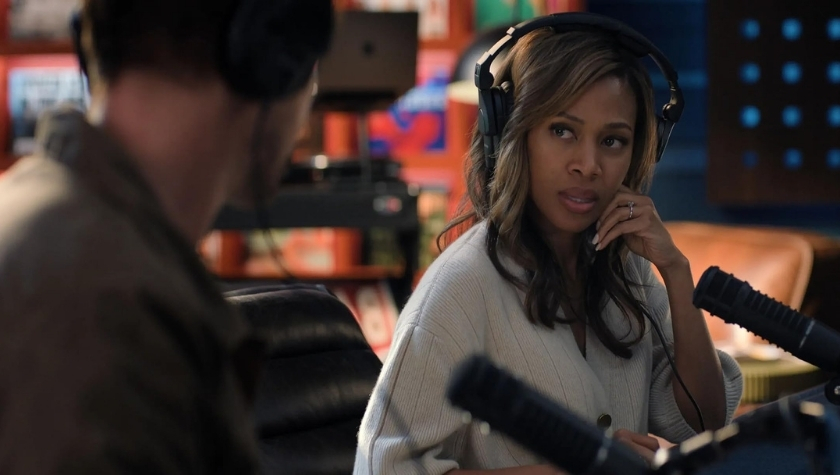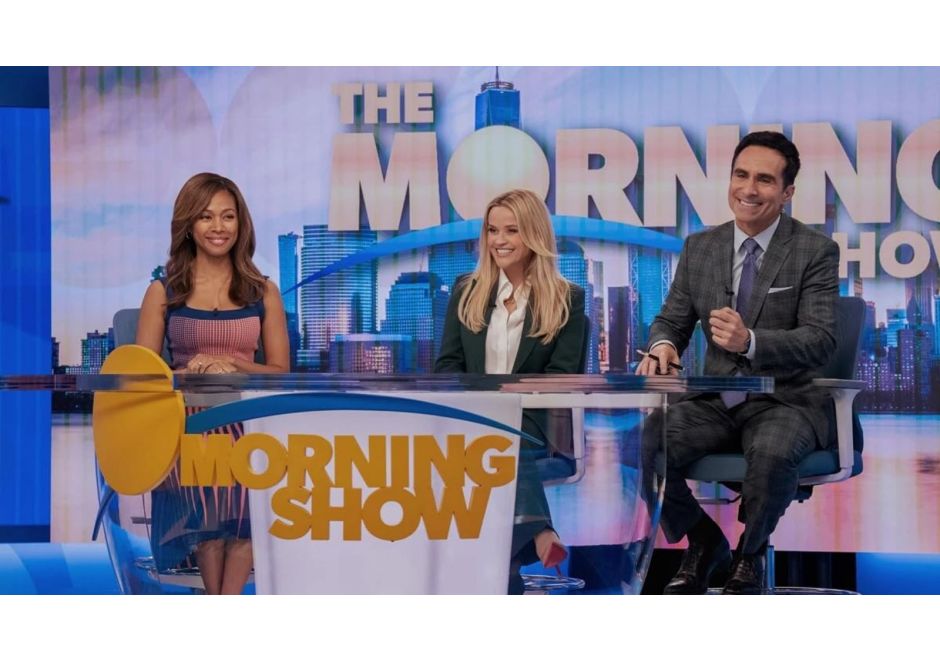The Morning Show is an Apple TV drama series that explores the behind-the-scenes world of a popular morning news program in a riveting and dramatic way, keeping us glued to the screen. Led by showrunner Charlotte Stoudt, the dramatic scripts pull from our real-world events, like the #MeToo movement and the journalist detained by Israeli forces in Gaza, to shape the story and characters of this hit show.
With The Morning Show renewed for a fifth season, let’s look back at what made the Apple TV show a drama we couldn’t stop watching.
1. It Plays in the Sandbox of Our Messy Reality
The Morning Show thrives because it understands how to capitalize on our chaotic modern media landscape. From jaw-dropping scandals with cultural implications to new laws and political upheaval that reshape daily life, the show uses real-world shifts to fuel character choices and intensify plot pressure. Moments like Chris Hunter’s speech after the overturning of Roe v. Wade, delivered brilliantly by Nicole Beharie, become even richer a season later when she delivers a raw monologue explaining the deeply personal grief behind her reaction. These are character beats born directly from the shifting world around them.
The series is unafraid to play in the sandbox of our messy reality, grounding its characters in forces that shape both their careers and their sense of self. It gives audiences a dramatized, behind-the-scenes look at a world that feels familiar, even when heightened. For screenwriters, the takeaway is clear: grounding your drama in contemporary instability gives every scene stakes that feel lived-in, urgent, and impossible to ignore.


2. Its Balance of Reality and Chaos
The Morning Show isn’t always serious, and that’s part of what makes its drama irresistible. Despite the prestige cast and Apple TV+ sheen, the show regularly swings into moments so wild they feel impossible… until our real world catches up. Think of Mitch Kessler (Steve Carell) driving off a cliff in Italy, Bradley Jackson (Reese Witherspoon) going to space, or Bradley unexpectedly encountering her brother during the January 6 insurrection. These moments are heightened, yes, but they’re only a few degrees off from the headlines we scroll every day. We’re living in an unhinged timeline, and the show knows it.
For screenwriters, the lesson is simple: reality no longer needs much exaggeration to feel dramatic. Modern news already blurs into entertainment, so the creative opportunity is to take the truth and push it just beyond what feels grounded. Let your characters step a little outside the lines of realism to explore what’s possible in your world. Do it well, and like The Morning Show, you may end up predicting the future.


3. It Uses Scandals as Catalysts for Character Growth
Scandals in The Morning Show aren’t cheap plot twists. Instead, they function as emotional detonators. The show’s characters are almost allergic to change due to their stubbornness, so scandals that strip them of power expose their blind spots, flaws, and desires. Don’t treat scandals as the climax. Instead, treat them like a spark that ignites a character’s evolution.
4. It Leaves the Door Open for Explosive Returns
Every great writer knows that no character is truly gone unless you show the body. In The Morning Show, “death” usually means character assassination — and even that never keeps anyone down for long. In Season 4, we watch the fiery downfall of Celina (Marion Cotillard) after Cory (Billy Crudup) outmaneuvers her. Audiences might celebrate her collapse, but showrunner Charlotte Stoudt hints she’s far from finished.
“I always say, with any character, that unless they’re dead, they could someday come back,” Stoudt told The Hollywood Reporter. “It’s possible. The reality is these people don’t go to jail… They pay their way out of it. It’s very infrequent that anybody does any time.”
Character returns aren’t about fan service; they’re about storytelling power. Bringing someone back lets you reintroduce pressure at the exact right moment, reopen old wounds, and complicate alliances in ways your characters aren’t prepared for. When a rival resurfaces with new motivation (especially revenge), the narrative stakes explode. That’s the real value: returns aren’t cameos. They’re catalysts.


5. It Snuffs Out the Characters’ Dreams, Forcing Them to Rebuild
Ambition is the number one driving force for nearly every character on the show: the anchor chair, the exclusive interview, the network presidency. But the show’s strongest moments come when those dreams collapse. Alex losing control of her public image, Bradley’s moral fractures, and Stella realizing power won’t protect her – all these moments strip the characters down and make them refocus on what is driving them forward.
For screenwriters, this is a reminder that denying your characters what they want is often the most compelling choice. Failure pushes them toward growth, reinvention, or self-destruction, all of which are the perfect fuel for a gripping drama.
The Morning Show is a compelling drama because it grounds characters in a chaotic, unpredictable world while balancing heightened stakes with emotional depth. Scandals, setbacks, and unexpected returns push characters to grow and adapt, keeping viewers invested. By blending real-world events with strong character arcs, the show is creating tension, urgency, and storytelling that feels both realistic and unmissable.

